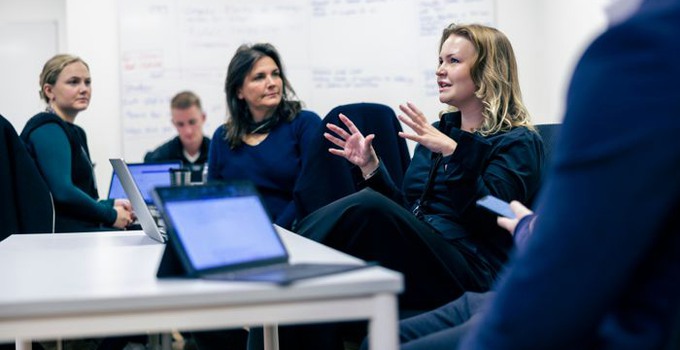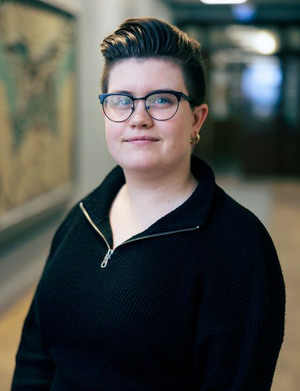
"You Get to Experiment Without Consequences"
Scenario exercise in the Master's programmes in Political and War Studies
Frida Blomér has just completed the intensive scenario exercise, Grand Strategy Game Week. The exercise is part of the introductory course in her master's program, Politics, Security, and Crisis, and is conducted alongside students from the master's program in War Studies and Defence.
What role did you have in the scenario exercise?
"I was part of the Russia team, and the division among the three great powers was pre-assigned. But on the first day of the game, we got to choose which department we wanted to join, and I chose the Ministry of Foreign Affairs because I’m very interested in foreign policy. Within the department, we shifted roles each day. For example, I presented policy briefs, participated in negotiations, wrote texts, and created propaganda. The entire scenario exercise had an authentic feel. The instructors took on their roles, and we even received orders directly from the Russian president."

Frida Blomér. Photo: Dan Sjunnesson.
What was the most challenging part?
"Taking part in negotiations, as that was fairly new to me. It’s all about what you say and don’t say, because we had our secrets—our open goals and our hidden objectives. The key was to keep a cool head. And everything becomes more challenging when you add the stress factor. This applied to every part of the exercise—for instance, we had just one hour to produce policy briefs. It required working quickly and as a team, and it was a good opportunity to practice. The first day was tough, but we quickly developed a structure and plan for how to proceed and learned a lot from it. Another takeaway from the exercise is the ability to quickly absorb information and present it to a large group."
How was it working under stress?
"When the stress factor was added, some participants naturally assumed more of a leadership role, and I noticed that I was one of those who took more initiative. Everyone contributed many ideas—and I observed that we listened to each other more. We didn’t debate as much as we’re used to but instead weighed each other’s suggestions and made quick decisions."
What did you enjoy the most?
"For me, the group discussions within our department were genuinely interesting, fun, and rewarding. We were twelve participants, most of whom are studying political science, but some came from the War Studies master's program. Beyond these two perspectives, every student brought their previous academic backgrounds into the discussions, which meant that a variety of perspectives emerged and were highlighted. This led to “aha” moments and solutions I might not have come up with on my own. One such example was when my group—Russia—deliberately detonated nuclear weapons in the Arctic and made it look like a nuclear exercise."
What do scenario exercises contribute?
"There’s a big difference between regular studies—reading and attending seminars—and applying theoretical knowledge to a realistic, life-like situation. You get to test things without any real-world consequences. Studies are typically very theoretical and analytical, so a scenario exercise like this also provides a fun break where we get to apply what we’ve learned. It also gives us a more concrete idea of what certain scenarios might look like in real-life situations. One thing I’ll particularly take away is the work on our policy briefs, as I’d love to work with similar analytical tasks in the future."
More about the Grand Strategy Game Week scenario exercise
More about the Master's Programme in Politics, Security and Crisis
More about
Political SciencePage information
- Published:
- 2025-01-15
- Last updated:
- 2025-01-15
